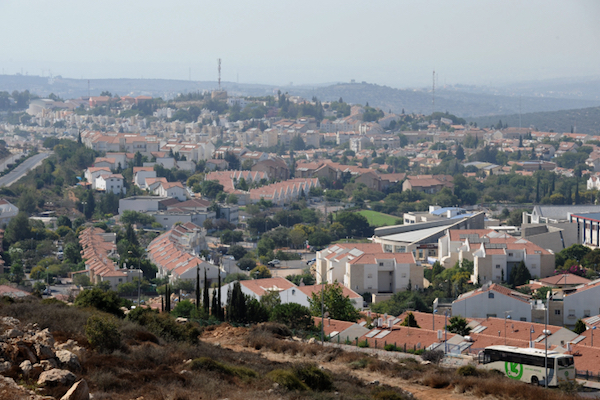The Israeli right has worked very hard to erase any distinction between Israel and the occupation — between Ariel and Acre, Hebron and Haifa. Ironically, this is the same thing he accuses Palestinians of trying to do.

Since B’Tselem director Hagai El-Ad spoke at the UN Security Council a week ago calling for an end to Israel’s half-century old occupation, the organization has been subject to vicious attacks and delegitimization, including by Prime Minister Benjamin Netanyahu. El-Ad’s very citizenship has been threatened by a senior member of Netanyahu’s Likud party, and thousands of Israelis have incited against him, including death threats. None of this incitement has been condemned by anyone in Israel’s ruling coalition.
Anticipating much of the backlash, El-Ad went on record throughout the Israeli press just 24 hours after his appearance in New York to clarify why he went to the UN: “I didn’t speak against my country, but against the occupation.” On the face of it, such a distinction seems fairly simple. The director of Israel’s largest human rights organization is lobbying for his country to stop policies that violate human rights, to stop exerting systemic violence against a people with no rights; in short, to stop holding the Palestinian people under military occupation.
To the establishment, that makes him subversive, unpatriotic, and anti-Israel. Contrarily, being pro-occupation and pro-settlements is indisputably pro-Israel as far as many Israelis and politicians are concerned. No one questions, for example, the patriotism of those – both in Israeli government and civil society — pushing to retroactively authorize settlement outposts built on private Palestinian land that even the government says are illegal. Nobody questions the patriotism of those who want to illegally annex the West Bank without the consent of the Palestinians who live there.
![Palestinian women wait to pass through an Israeli military checkpoint in Bethlehem leading to Jerusalem to pray at al-Aqsa Mosque, (File photo: Activestills.org) Palestinians wait to get through at checkpoint at the separation wall in Bethlehem [file photo], (Photo: Activestills.org)](https://static.972mag.com/dev/uploads/2013/03/Bethlehem_wall.jpg)
Palestinian women wait to pass through an Israeli military checkpoint in Bethlehem leading to Jerusalem to pray at al-Aqsa Mosque, (File photo: Activestills.org)
The message being propagated by Netanyahu and his government, and unchallenged by the majority of Israelis, is clear: fighting to end occupation and fighting for Palestinian human rights is not only slandering the country, it’s tantamount to treason — as far as they are concerned speaking out against occupation is the same as speaking out against Israel. This type of tactic works well to deflect criticism and silence dissent by delegitimizing the critic. Applied long enough and to enough people, such tactics set a precedent for seriously curtailing free speech and political dissent; it is no wonder the U.S. came out in defense of B’Tselem and free speech and why the organizations donations have increased tenfold since.
That’s how precedents work: the more Netanyahu and his ideological kin push that line, the more speaking out against occupation will in fact become synonymous with speaking out against Israel. I would argue it is already impossible to separate the two.
That is exactly what Netanyahu is after. He and the Israeli right have worked very hard over the years to make sure there is no daylight between Israel and the occupation — to erase any difference between Ariel and Acre, Hebron and Haifa. Ironically, this is the same thing Netanyahu accuses Palestinians of trying to accomplish. But the truth is, any distinction between the Israeli state and the occupation of the Palestinians has long been erased.
As professors Ariella Azoulay and Adi Ophir wrote in their 2008 book, The One State Condition:
The Occupation, essentially a provisional state, has evolved into a permanent ruling structure, which seeks to remain just what it is: an Israeli occupation regime. Its ‘temporariness’ lends this structure its legitimacy, at least in the eyes of most Israelis, as well as most Americans, because it is utterly impossible to reach agreement on either of the two opposed states that might replace it.
What Hagai El-Ad and the entire Israeli anti-occupation human rights community in Israel are saying and doing poses such a threat to the Israeli establishment because ending the occupation does in fact undermine the existence of what the State of Israel has become today — a state that is synonymous with occupation.
To decouple Israel from its occupation of Palestine would require the complete dismantling and overhaul of Israel’s state institutions, culture, economy, and infrastructure. It would require a fundamental restructuring of Israeli society, transforming it from one that controls another population to one that strives to upholds equal rights for everyone living under its control.
Such a process frightens many Jewish Israelis, including those in the so-called opposition, because it means losing certain privileges a Jewish state affords them. For that reason, the most basic, simple and understandable demand at the frontier of Israeli dissent today — ending the occupation — is also the most complex, subversive, and dangerous.


